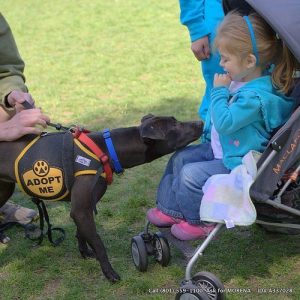Questions to Ask When Adopting a Dog
Having a dog is a big responsibility, and careful consideration should be given as to where the pet comes from. Many people chose to adopt their pet. 

Each dog who is up for adoption has a unique history. The following questions should be asked when searching for an adoptive pet:
1. Is the dog spayed or neutered and vaccinated?
Reputable shelters will not release a dog unless they have been spayed or neutered and in otherwise good health. Traditionally puppies are spayed or neutered between 6 to 9 weeks of age but it’s now possible to have it done as early as 8 weeks for healthy pups. Spayed and neutered dogs tend to be healthier and calmer. The adoption staff also want to ensure that you will not breed the dogFor the most part, spayed and neutered dogs are healthier and calmer (especially males). The adoption staff also want to ensure that you will not breed the dog.
2. How does the dog behave around other dogs, or cats or children?
This information is important as you introduce your dog to your neighborhood or dog park, and integrate him into your existing household.
3. What is the dog’s history?
Knowing the reason the dog is in the shelter can provide a clue as to its behavior. Perhaps it was given up because it has behavior problems you’ll need to work with him on. Or, he was a loved and pampered pet whose guardian passed away. Often, shelters don’t know the history. The dog may have been a stray or was abandoned. While knowing the history isn’t crucial, it can help you understand certain behaviors so you will have more patience while training.
4. Will the breed fit your life-style?
Different breeds have different energy levels. If you are an athlete, you may choose a dog with a high energy level who can run with you. Dogs with high energy levels need lots of exercise. If you are more sedentary, look for a dog who is a couch potato, one who is content with slow and easy walks. If you are a senior or have children, look for a gentle breed. People who are allergic to dogs may want to look for what is called a hypo-allergenic breed. These breeds shed less, thus creating less dander.
5. If I encounter problems, how will you help?
This may be an especially good question for those who are new to caring for a dog. You should expect that not only will your new pet go through an adjustment period but you will too. It could take up to a few months for all to get adjusted and into a routine. So if you encounter issues along the way, will the organization provide any training or other consultative services to ensure you have support and a good experience as a new pet guardian.
Dogs are never born “bad”. Unfortunately, some dogs have irresponsible or abusive guardians, and can develop behavioral problems in response. Many of them wind up in the shelters. Good news is, many of these behaviors can be modified. Learning about dog breeds and their behavior will be a big help in choosing, training, and getting to know your pet.
With time, patience, and understanding, an adopted pet can be a great addition to your family.
Photo: Courtesy of maplegirlie via Flickr (CC BY-ND 2.0)

